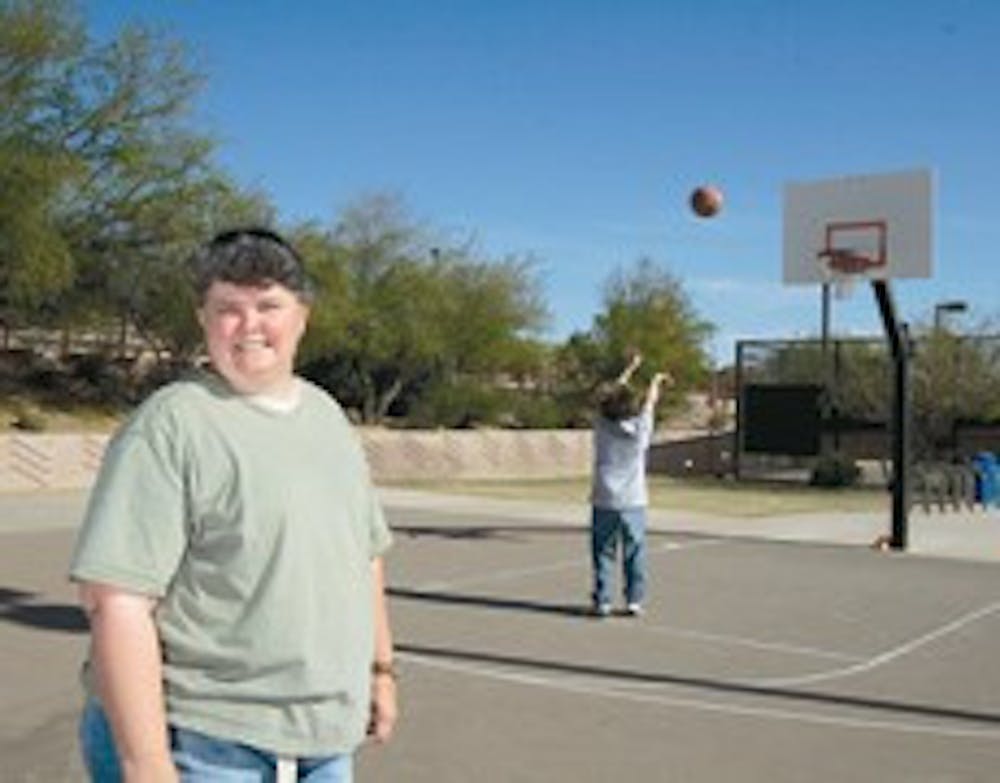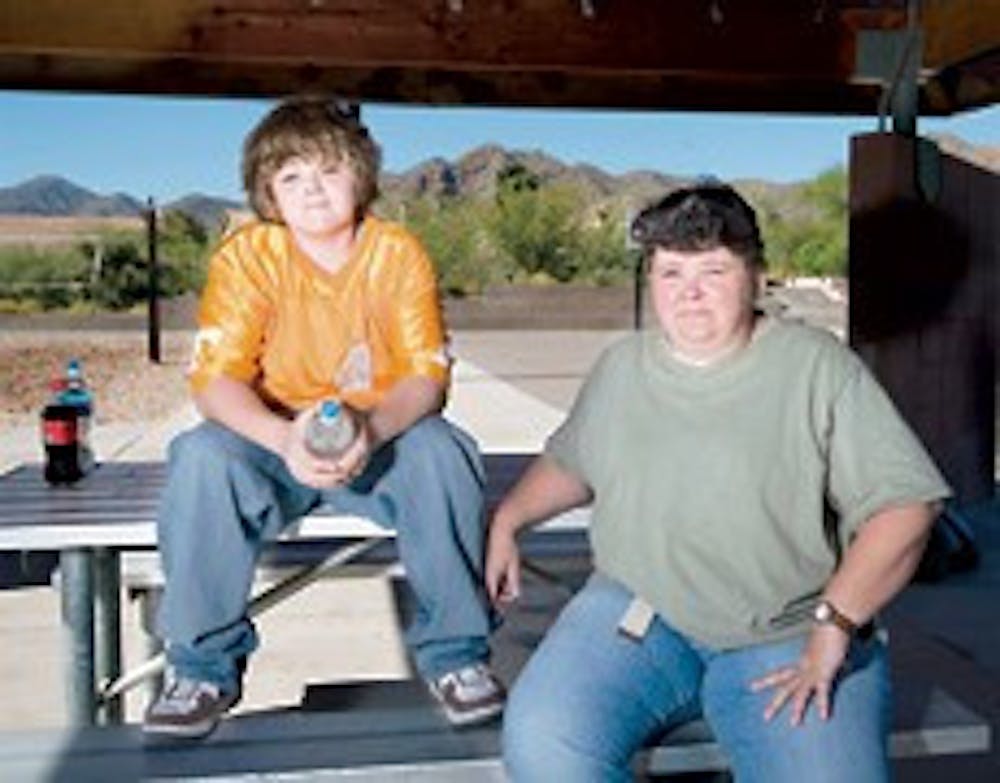The white Ford Bronco lurched to a stop under the red light hanging above the Loop 202 on-ramp. Although the truck rumbled loudly, its engine noise still couldn't drown out the voice of her father inside her head. Mary Manning realized she was more nervous than she had been in a long time.
"What makes you think you can handle a kid?" he had said. "You are 31 years old and have trouble committing to a new car payment or even a place to live."
Only 15 minutes until we get to Sky Harbor Airport, she thought. Only 15 minutes until everything changes.
The terminal was filled with people, but the boy was suddenly there striding toward her in his red and black plastic tennis shoes.
With sandy blonde hair, bright blue eyes and round cheeks, the striking family resemblance told her there was no mistaking it was he.
Manning's life had changed direction innumerable times — managing horse barns all over the country with no commitment to anyone or anything before the summer of 2001.
That was when Jake Nanney, the 6-year-old son of a cousin who she had never met, came to live with her when no one else in the family could take him.
It was a crucial event that would change her from unpredictable tumbleweed to a stable parental figure and student.
In the six years since Jake became her legally adopted son, Manning moved on from working in the horse industry and returned to school full time, expecting to graduate this spring.
Adult students were at one time few and far between, but have now become influential fixtures in many of the University's classrooms.
Manning is now one of 41 students between the ages of 18 and 52 who has been able to afford a higher education from ASU because of a private scholarship called the Nina Mason Pulliam Legacy Scholarship.
"I loved the horse industry, but there was nothing there for me anymore," Manning says. "I never felt intellectually challenged like I do in school, and there wasn't a whole lot of reward. ASU was a lifestyle choice I had to make for myself and Jake."
The Nina Mason Pulliam Legacy Scholarship is a $70,000 scholarship allotted over a six-year period that helps students like Manning work toward a college degree.
The scholarship was started in 2001 and gives adults 25 years or older with a dependent, youth who have spent extensive time in the welfare system and adults living with a physical disability a chance to go to college when they could not afford it otherwise.
Manning became a single mother after she adopted Jake, which made her eligible for the scholarship.
She is now in the final stretch of her education. In May she will graduate along three of her fellow scholars with a Bachelor of Arts in political science and hopes to pursue her dream of attending law school.
However, the road to graduation was rough even before she decided to return to school.
Just a tumbleweed
Manning was still managing horse barns for the first three months after Jake came to live with her.
The two shared a musty old room with a loft at a ranch in Rio Verde, Ariz., and he was missing school at least once a week to travel with her to horse shows around the state.
She knew that this way of life was not suitable to raise a little boy, so Manning quit her job. She also moved into a small apartment with her brother and his fiancée to have help with Jake and relieve her financially.
"I had never shared a space with a kid, or a boy for that matter," she says. "I didn't even know how to cook macaroni and cheese or let alone grocery shop. I had to read the directions to make Kool-Aid! I was completely lost on raising a child."
The confusion culminated when Manning was called into the principal's office at Jake's school.
In his first week, Jake had been bullied by a few other kids who had spit on him while he got off the bus. In turn, he punched them and was sent to the principal's office.
This was not the first time Manning had witnessed Jake's behavioral problems.
He had an innate fear of the interstate, for instance, and would sometimes become angry or scared to the point where Manning would have to restrain him until she could pull off the road.
In general, Manning says Jake was unbelievably strong and well-mannered for a child who had come from an abused home. But Manning still had a desire to somehow gain his trust and understand the reasons why he sometimes acted out.
Manning says the principal was one of the first that realized the strains of the new living arrangement. It was then that the two began attending counseling, family-strengthening classes and social skills classes in order to help them both adjust.
The first step
Manning says she had only casually thought of returning to school until one day when Jake's third-grade teacher, Mrs. Hebert, struck up a conversation with her as she had done many times before.
An older woman who had become wise from decades of teaching, she connected with Jake as no other teacher had and had become a mentor to Manning.
This wasn't the first time she had talked to Manning about returning to school, but for some reason that day she said her pestering had finally sunk in — or maybe she was just out of excuses.
"She knew that was the only way I could really make something of myself and something for Jake," Manning says. "I remember laughing when she first brought it up but she kept on with the idea. I didn't even know how I was going to pay for it; but she just told me it would work out, and it eventually did."
But when Manning applied to ASU for the spring semester of 2003, the response was humbling. She didn't get accepted.
She says she knew she had to start from scratch in order to get to where she wanted to go. She found her first dingy apartment in an overcrowded family-style complex where she could start to earn credit.
Within the next week, she had enrolled as a student at Chandler-Gilbert Community College.
During that semester an adviser told Manning she had found a scholarship called the Nina Mason Pulliam Trust that could help her afford the rest of her education. It was then that she applied and was selected for a competitive panel-type interview.
"I remember she had a strong interview," says Cory Gonzales, program director for the Nina scholarship at ASU. "She demonstrated commitment, perseverance and intelligence in her manner with us. Mary also had a straightforward attitude and seemed open to the close-knit approach we take with the program."
When she was notified that she had been chosen as a scholarship recipient, Manning decided to take a chance and apply to ASU for the upcoming semester.
All that she knew for certain was the $2,750 living allowance granted by the scholarship would be enough to afford an apartment big enough that Jake could have his own room for once.
The Real Turning Point
It was 9 a.m., but she had already been up for about three hours — enough time to feed Jake breakfast, fight rush hour traffic, drive him to school and get herself to school before her first class.
However, that wasn't what was making her exhausted after only her first few weeks of college at ASU.
Seemingly standing in the middle of it all, Manning says she watched as people shuffled by in hordes or whizzed by on bikes and skateboards with looks of sheer determination to fight their way to class.
"Really, I was just trying not to laugh," she says. "I felt like I might as well be back on the ranch since the students all looked like cattle being shuttled into pens."
But while the crowds were a lot to handle, the noises were what she said overwhelmed her.
Manning was diagnosed as a teenager with a form of Attention Deficit Hyperactivity Disorder, also known as ADHD.
Unlike other people, she hears everyday noises amplified to 8,000 frequencies above what the average person can hear, and she struggles to focus in classes because of it.
In high school, she said the noises had driven her to levels of anxiousness that caused her to fail classes.
And during the first test in her college geography class of 500 people, she said she felt she would face the same failure.
"I remember how loud everyone flipped the pages of their test to refer to the maps on the front page," Manning says. "No one was talking, but after about 10 minutes I couldn't concentrate. The papers sounded like a barrage of crashing waves, and I was paralyzed at the center of it."
During the test, Manning said the professor must have noticed the look of shock across her face because he motioned for her to crouch behind the emergency exit of the lecture hall to finish her test.
After that experience, she said she invested in near sound-proof earplugs and has since worked on calming herself into a state of meditation while taking tests.
With support from Manning's scholarship classmates that year, her academics improved over the following semesters, and her relationship with Jake became more comfortable.
"I was in awe of her when I first came to ASU as a Nina," says Rhonda Hemming, a friend and classmate of Manning for three years. "She was everything I was not, or didn't know I could be. I am still amazed by Mary's unbelievable strength, but as I have come to know her I have realized that she is human, just as I am."
Hemming says Manning does well juggling motherhood and student life.
"She struggles to be a good student, like when she is being a good student she feels like she is not doing her best as a mother," she says. "She still works on finding balance like the rest of us."
But Manning says the fear of failure has always been her demon. And more than anyone, she says Jake is the one who can see through her outward confidence.
"You can tell she's nervous because she starts organizing things around the house, especially the soups," Jake says. "She got that way when she was taking that lawyer test last semester. Even though she didn't talk to me about it, I knew she was kind of afraid. She worked really hard studying for it."
In the spring of 2007 Manning took a semester-long course to prepare her for the LSAT, or Law School Admission Test, which would determine whether she was accepted to law school.
Although she did reasonably well, she said she decided to delay her graduation until this spring. This will give her a chance to retake the test for a better score and allow her more time to prepare for life after college.
"Mary, like many of our students, does not only have a financial need," Gonzales says. "They have the need to be recognized as the smart, capable, motivated, and intelligent people they are."
Gonzales says Manning's past is providing her excellent motivation for the future.
"They want the opportunity to prove, if only to themselves, that even though they have challenges and barriers and have faced more adversity in their short lives than most people can dream, and that they are talented," he says. "Mary has many of these traits, and she is going to go far."





